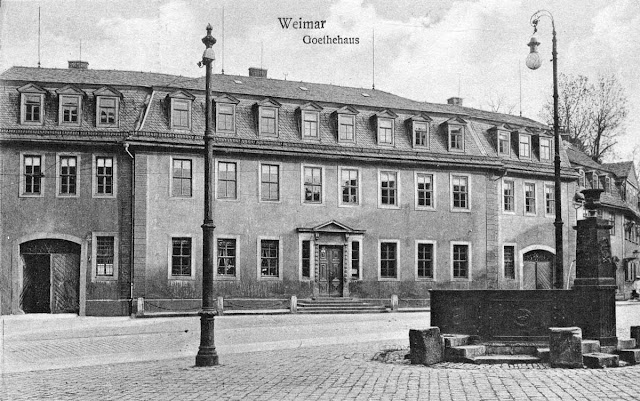 |
| Goethehaus, Frauenplan, Weimar |
A sloppy travel plan and an unconfirmed cancellation of expensive hotelrooms were the reasons I rushed to Weimar and Leipzig for a blitz – visit over a weekend. Rather drive 1200 km than waste 200 euro of good travel money. My wife and I arrived in Weimar in the late morning, bought immediately our entrance tickets to the Goethe house for the afternoon visit and went then for a short lunch of pastries and geback. The weather was splendid.
Weimar is a
cosy town, with cobbled streets and those typical façades which could be an
excellent backdrop for any reenaction of a dark Grimm or Hoffman tale. Goethe’s
house is a large three story building where the famous writer lived for more
than 50 years. `
The
entrance of the house, passes over a series of “magical” stairs. They are only
half as high as normal steps and very deep and wide and stepping on them gives
an exhilarating feeling as one climbs effortless towards the front door. An
idea Goethe got in Rome, the guide explains, and designed as to instill in
the visitor a feeling of hospitalty up to the front door with the “Salve”
( welcome ! ) words laid in the wood in the floor.
Inside the
house, each pastel – painted room has a magnificent dark and creaking wooden
floor. The rooms are decorated with copies of classical statues, paintings and
other artworks Goethe hoarded during his long life.
As you walk
through the different rooms of the house, you get a good impression of Goethe
and his life. Much more so, I would say than Safransky’s biography of Goethe,
which I could not finish.
For some
reason, his large book collection is guarded behind bars.
Goethe’s
sleeping room contains his small bed and the cosy seat in which he died…of old age,
closing his eyes after a last glimpse at all the beautiful things he collected.
Even the classy decency of his passing away makes one jealous. The window at
which he looked as he asked for more light gives out on a splendid garden.
After the
Goethe house we tried to grab a visit of the Anna Amalia library and its
sumptuous rococo room, but the visits were sold out for the next weeks.
Leipzig is
a less Romantic place than Weimar, but it was here in the fifteenth century Auerbach Keller at
the Mädlerpassage, Goethe’s favorite when he
was a student in Leipzig, that the famous man got his idea
for a Faust novel. We had our dinner there and marveled at the wall paintings
describing several scenes of the Faust legend.
We finished
our blitz – trip the next day with a short visit to the Thomaskirche where Bach
was Kapellmeister for many years and where his remains, after being moved
around the town for a while, were finally laid to rest.
A great two
days !